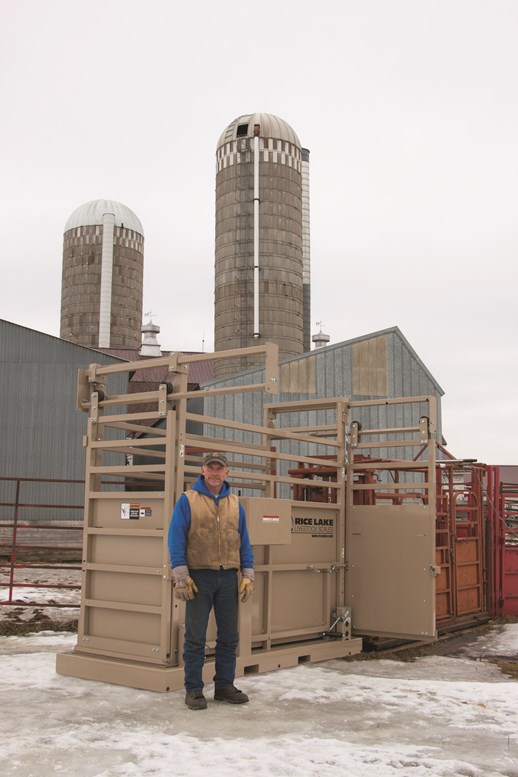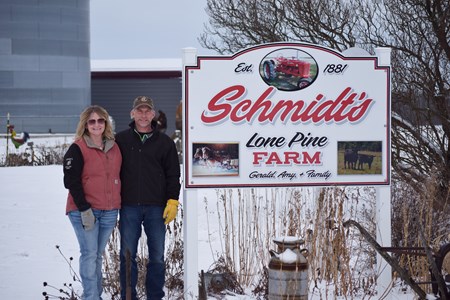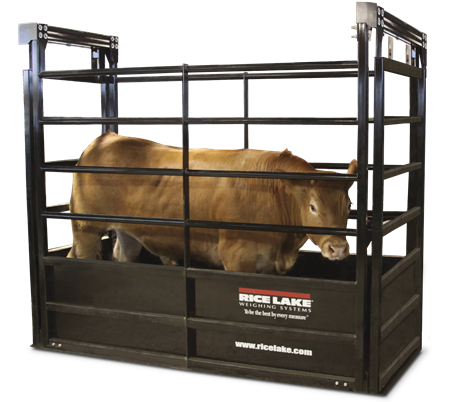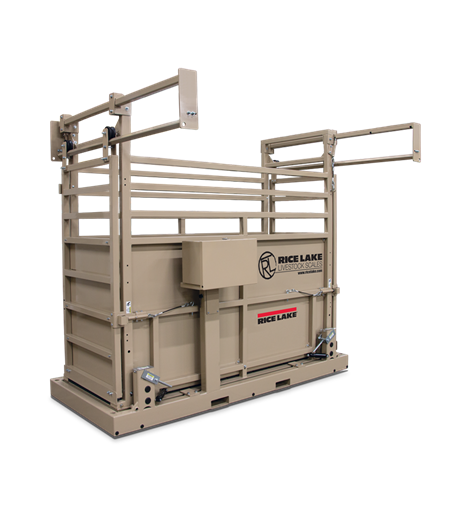Is the website displaying in the correct language? Please confirm or select a different language.
Your region has been set automatically. Please confirm or select a different region.

Five Generations on Lone Pine Farm
Gerald and Amy Schmidt are fifth generation family farmers who work hard year round to make the most profit for their beef cattle farm. With long hours, incredible work ethics and the help of a durable, long-lasting Rice Lake livestock scale, the Schmidts have kept Lone Pine Farm the successful family farm it has been for more than 135 years.
Publish Date: 07/15/2016
Gerald, Amy and their three boys all have their hands in farm operations, and it has always been a sense of pride to the Schmidt family, serving as the cornerstone in almost every aspect of daily life. In recent years, Lone Pine Farm transitioned from dairy farming to raising beef cattle and crop farming. “When we sold the dairy cows, we needed something else on the farm we could watch grow,” says Amy. “Just knowing you are raising animals out on the farm is the best feeling.”
Gerald and Amy raise beef cattle every year and sell their calves as feeders. “We usually have around 50 calves every year. That’s the amount we like to stay at with the amount of pasture we have; it is the most profitable for us to keep the farm around that number,” says Gerald. In addition to the beef cattle herd made up of Angus, Limousin and Simmentals, Lone Pine Farm is also home to horses, donkeys and pigs. Every animal has a role in the farm’s operations, and is loved by the Schmidt family. “The calving season is a lot of fun to raise the babies and watch them grow,” says Amy. “The best part is watching the calves interact with their moms. The mom can make just one call, and the calf knows—oh, that’s Mom’s call.”
Amy and Gerald’s three sons Josh, Colten and Chase have grown up helping on the farm and appreciating the hard work involved. During calving season, the cows are watched closely and checked on many times throughout the day. “We all take turns checking the cows, and that includes our youngest son Chase, who comes home from school and rides the ATV out to check on the animals. Since he was 12 years old, I remember him bringing home a friend to help tag new calves. They thought it was just the greatest thing to work with the cattle and be farm kids. Family is huge for us. It’s all done with family,” says Gerald.
Running a family farm is a lot of work, and every piece of equipment on the farm needs to pull its own weight to contribute to operations. Not only does farm equipment need to withstand harsh environments and the demands of hard work, it needs to be relentlessly reliable. With beef cattle, every sale comes down to weight. Making sure his feeders finish out at their best weight is key to Gerald. “We sell our calves in the winter after weaning them. To us, it’s important for them to be as heavy as they can—that means coming across the scale at about 800 pounds.”
An animal’s weight is crucial to farm operations.
From health checks, vaccinations and medications, to ensuring a competitive weight for fair animals, a livestock scale is an important tool for success. During vaccinations, the Schmidts rely on an accurate reading from their livestock scale to ensure they give each animal the correct dose. “Giving de-worming medication to our cattle is based on weight, so when we use our Rice Lake scale, we know it will be accurate.
Having an accurate weight reading saves us money on vaccinations and medications while ensuring the animal gets its correct dose. The scale really makes the difference—with a smaller calf, I can give them a dose that is proportionate to their weight. Using an accurate scale is money saved,” says Amy. Knowing if the fair steers are not gaining like they should also lets Gerald and Amy know that the animal may be sick, or that environmental conditions are not optimal. “If they weren’t gaining and it was warm out, we could make the connection that they weren’t eating as much because of the weather,” says Gerald. “So we would know to put them in the shed to cool off with the fans. Then we could put them back on the scale, and if they were gaining again, we would know that was the problem.” With fair steers, you can’t afford a day or two not gaining like they should.
Weighing the fair steers and determining their daily rate of gain is essential for Gerald. “July is fair time, and if they aren’t finished out by then, Chase wouldn’t be competitive in the fair ring. Making sure they meet rate of gain and have the most weight before then is everything,” says Gerald. “We weigh them leading up to the fair and we know if we need to change their rations accordingly. We know what we need to accomplish in pounds per day, and we use the scale to keep track of that.” The pigs raised on Lone Pine Farm are also weighed on the scale to assure optimal weight. “We have had fair pigs, too, and that was the same thing. We needed to track them closely to make sure they were ready,” says Amy.

The Rice Lake scale at Lone Pine Farm also helps Amy and Gerald make business decisions for the future of their herd. “The ability to consistently see and track the rate of gain that one bull’s calves are producing is great. We can make the decision with confidence to sell a bull and get another if we can track the trends that a specific bull’s calves are lighter or inconsistent,” says Gerald.
What do Amy and Gerald value most about their Rice Lake scale? Reliability. “It is very dependable; we have never had any problems with it. It is always accurate,” says Gerald. And the durability of a Rice Lake scale speaks for itself. “When you need it, you need it. We’ve never even considered that the scale wouldn’t work. We know we can depend on it, even when it gets used hard,” says Amy. “When you can have a piece equipment for 10 plus years, and it withstands our harsh winters on the farm, its durability means a lot.”
With the introduction of Rice Lake’s SAS Series single animal scale, Gerald and Amy can clearly see the benefits of a forthcoming upgrade. In their current setup, Gerald and Amy manually record their animal weights, tag number and the date of weighment. With the SAS and 920i® Rate of Gain software and Epson® TM-U295 ticket printer, operations will be streamlined and record-keeping will be easier. “I’m excited about using the SAS and Rate of Gain software so I don’t have to do those calculations by hand anymore, or carry around my notebook and pen. The scale is going to do the work for me,” says Gerald.
“Having the rate of gain and date on the tickets will be so easy for record keeping. When we’re vaccinating and castrating, it can be so cold; and your notebook would be flying around in the wind and your pen wouldn’t want to work. It is going to be nice and easy to manage with the SAS,” says Amy. The SAS 920i indicator also includes a USB port so Amy and Gerald can easily transfer weight results to a flash drive and onto their computer. With 48-inch solid kick panel sides and thick wall tubing, the SAS offers added safety for both the animals and the handler. Load cells and electronic equipment are housed in enclosures above the subframe, adding even more protection and reliability. The SAS is built tough with a load capacity of 5,000 pounds—strong enough to weigh the Schmidts’ one-ton draft horses.
The future is bright for Lone Pine Farm. “The SAS is going to speed up our operations,” says Gerald. “The scale is built to fit right in with our current setup and having the weight data and rate of gain available right when we need it will make it even easier for us to track our herd’s trends during selling time.” A durable construction backed with unyielding dependability makes Rice Lake livestock scales tough enough to work side by side this fifth generation farm family.
Subscribe to Rice Lake Magazine
Sign in or create a Rice Lake website account to request a Rice Lake Magazine filled with application stories like this one be sent to you.
Account Sign In Create an Account


 My Account
My Account


